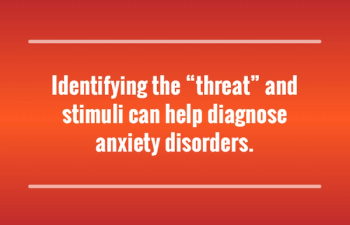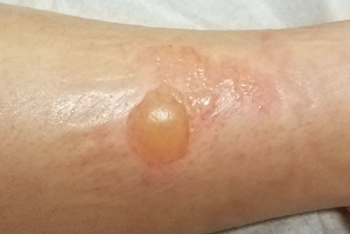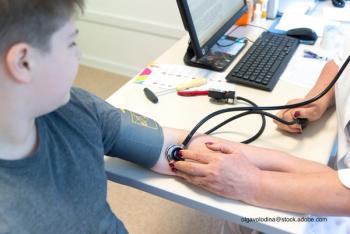
Support from fathers trumps that of mothers when it comes to mitigating damage from discrimination over sexual orientation in LGBT teenagers and young adults.

Support from fathers trumps that of mothers when it comes to mitigating damage from discrimination over sexual orientation in LGBT teenagers and young adults.

Bug bites, sunburn, and homesickness are the worst things that parents likely expect to happen to their children when they send them off to summer camp. However, a new study in Journal of Allergy and Clinical Immunology: In Practice indicates that camp may not be prepared to recognize and treat anaphylaxis caused by food allergies.

Let’s recap this year’s top devices for tech-savvy pediatricians. Are they on your wish list?

Because appropriate early treatment of anxiety disorders is key to either preventing or reducing a negative impact on a child's life, it's important for the clinician to diagnose the correct disorder by identifying the "threat" and feared stimuli. Here's a look at 7 types of anxiety disorders and their common behaviors.

Discussing vaccination against influenza can go a few different ways. For parents who are either unconcerned with the influenza immunization or who had children who received it in previous seasons but still got influenza, a targeted, evidence-based patient education supported by the influenza immunization and hospitalization data could turn the tide.

Motor skill delays are an early predictor of language delays later in childhood and into adulthood in individuals with autism spectrum disorder.

A 9-year-old girl presents with a painful blistering patch on her right leg noted when her mother picked her up from school following an after-school ski club trip. What's the diagnosis?

Before turning to selective serotonin reuptake inhibitors (SSRIs) to treat anxiety and depressive disorders in children, check out the freely accessible, genotype-based, drug-dosing online knowledgebases for guidance.

A new study reveals that mothers who are aged younger than 20 years when their first child is born were more likely to have a child with attention-deficit/hyperactivity disorder (ADHD), and researchers suggest maternal age and other genetic factors may be the cause.

What if someone is posting suicidal messages or something disturbing on social media? Some social media sites also have a process to report suicidal content and get help for the person posting the message. Each offers different options on how to respond. Here's how 6 of the most popular ones do it.

There is little evidence on the best ways to offer intervention on drug use, so pediatricians and PCPs are advised to just steer clear, for now.

Pediatricians can use the growing body of knowledge from biomedical and grief research as the basis for improving their care of bereaved parents in crisis.

For a child presenting with a headache, it’s critical to make the correct diagnosis based on history and physical exam.

Recent research advances are providing insight on infectious causative mechanisms for this recently described disease in children.

Pediatricians need to implement the strategies of assessing, adjusting, and reviewing symptoms and risks of severe asthma to confirm the diagnosis and implement appropriate interventions.

Why is there a gap in the mental health training of general pediatricians? This is a question that brings about a wide spectrum of opinions and likely just as many emotions from clinicians. Although there is no single answer to this question, the lack of appropriate training in mental health remains an issue in the training of pediatricians.

A recent study suggests that positive childhood experiences may counter the damaging effects of adverse experiences.

A recent study suggests that positive childhood experiences may counter the damaging effects of adverse experiences.

A recent study suggests that positive childhood experiences may counter the damaging effects of adverse experiences.

A recent study suggests that positive childhood experiences may counter the damaging effects of adverse experiences.

A recent study suggests that positive childhood experiences may counter the damaging effects of adverse experiences.

A recent study suggests that positive childhood experiences may counter the damaging effects of adverse experiences.

A recent study suggests that positive childhood experiences may counter the damaging effects of adverse experiences.

A recent study suggests that positive childhood experiences may counter the damaging effects of adverse experiences.

A recent study suggests that positive childhood experiences may counter the damaging effects of adverse experiences.

A recent study suggests that positive childhood experiences may counter the damaging effects of adverse experiences.

Pediatric educational and policy conferences are always special, providing opportunities to update knowledge and practice skills; introduce new practice guidelines with rationales for evidence-based changes; present the most recent research findings that have the potential to improve practice and healthcare outcomes; and unequalled opportunities for networking.

This month’s spotlight is Pediatric Oncology as Contemporary Pediatrics sits down exclusively with pediatric oncologist Lisa Diller, MD, vice chair, Clinical Affairs, and medical director, Clinical Cancer and Blood Disorders Service Line, Dana-Farber Cancer Institute, Boston, Massachusetts, to discuss the one key condition for which she believes community pediatricians should be especially aware-retinoblastoma.

A European study reveals that obesity criteria used by the American Academy of Pediatrics to diagnose pediatric hypertension helps identify more children at risk of cardiovascular disease.

To address the different fears motivating vaccine-hesitant parents versus antivaccine parents, one must understand the historical resistance to vaccination.